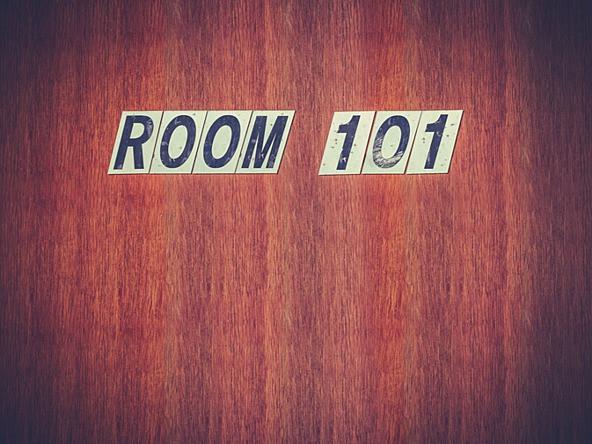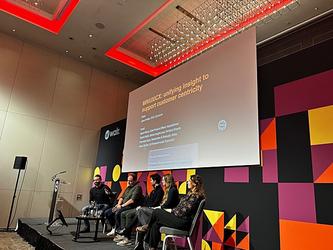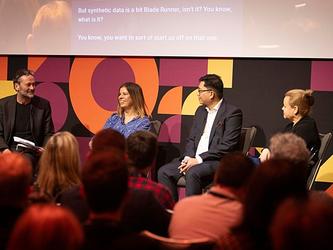Room 101: What market research terms should be binned?

In George Orwell’s Nineteen Eighty-Four, Room 101 refers to a place where victims of state control are exposed to their worst fear. The concept has since broken into the mainstream, with television show Room 101 tweaking the format to allow guests to choose a range of pet peeves to be condemned to Room 101 or saved at the presenter’s behest.
At the Market Research Society conference, one session adopted the format for the insights industry, with two teams of three contestants asking the audience to choose which market research terms, concepts and practices to dispose of and which to save.
Participants were FlexMR’s Danny Russell and Paul Hudson, Shehnaz Hansraj of Viking Cruises, Keen as Mustard’s Iosetta Santini (replacing Nicola Stevens of Close Brothers), strategy and communications professional Lisa Hulme-Vickerstaff and media and market research specialist James Sallows, with Lucy Davison, founder and chief executive at Keen as Mustard Marketing, hosting.
‘Debrief’
Hudson argued to get rid of the ‘debrief’. “By its very nature, it signifies the end of something, whereas in reality, that’s the beginning of an insights journey through an organisation,” he said.
“Decisions don’t end – they need to constantly evolve. By using the word debrief, we are constraining ourselves to nicely wrapping things up into a boxed-up beginning and end. If we want to be decision consultants, we need to move beyond an ending and live with insights through the organisation and beyond that point.”
Speaking in opposition, however, Russell said that “the debrief represents one of the very few times when you get all the key stakeholders in the same room at the same time”, adding that “it is a big show and a big opportunity to impress the stakeholders”.
Hansraj added that it could be hard to know if stakeholders “have understood what you presented” without a debrief. Nevertheless, the debrief was consigned to the bin.
‘A seat at the table’
Russell proposed binning the term ‘a seat at the table’. He said it was unlikely to happen, adding that being on the board did not guarantee input, as many decisions were taken before meetings occurred. “It is not the way to influence decision making in organisations,” he said. “Much more important is to have a seat at many tables.”
However, others argued that having a seat at the table is important, with Sallows noting that 10% more budget was given to insight departments that did have board representation. The concept was therefore saved by the audience.
‘Data-driven’
Sallows proposed eradicating the term ‘data-driven’, and his proposal was successful. “The challenge is we have commoditised ourselves as an industry over the years by embracing this term so wholeheartedly when others have done the same,” he said.
“See where the budgets are going – they are not going to us. We have to fight to be relevant, we have to fight to be heard. How are we distinctive if we’re just ‘data-driven’? Data can fuel us, but insights and intelligence have to drive us.”
Socioeconomic classifications
Hansraj argued for removing socioeconomic classifications or groupings based on occupation. “How relevant is it anyway? It was invented in 1913,” she said. “The current language just isn’t working – it’s just not fit for purpose anymore.”
Hudson countered that we need simple constructs to help communication across organisations, and instead suggested the categories could be updated rather than jettisoned altogether. The audience voted to bin the classifications.
Hypotheses
Santini made the case for removing hypotheses. “Yes or no hypotheses limit the way we think,” she said. “They reduce our research to chemical test-type statements that don’t allow us to do our job.”
However, after opponents said that hypotheses were needed to communicate findings to clients and to structure research projects, the audience voted to retain hypotheses.
‘Market research’
Finally, Hulme-Vickerstaff said she wanted to eradicate the term ‘market research’. “It is no longer reflective of our industry, what we do and the value we bring,” she said.
“Market research is a description of the process – we are so much more now than the process. Now it is about outcome, insight and interpretation.” The audience agreed – it was binned.
Attendees of the MRS Annual Conference can access sessions on-demand via the MRS website.

We hope you enjoyed this article.
Research Live is published by MRS.
The Market Research Society (MRS) exists to promote and protect the research sector, showcasing how research delivers impact for businesses and government.
Members of MRS enjoy many benefits including tailoured policy guidance, discounts on training and conferences, and access to member-only content.
For example, there's an archive of winning case studies from over a decade of MRS Awards.
Find out more about the benefits of joining MRS here.














0 Comments